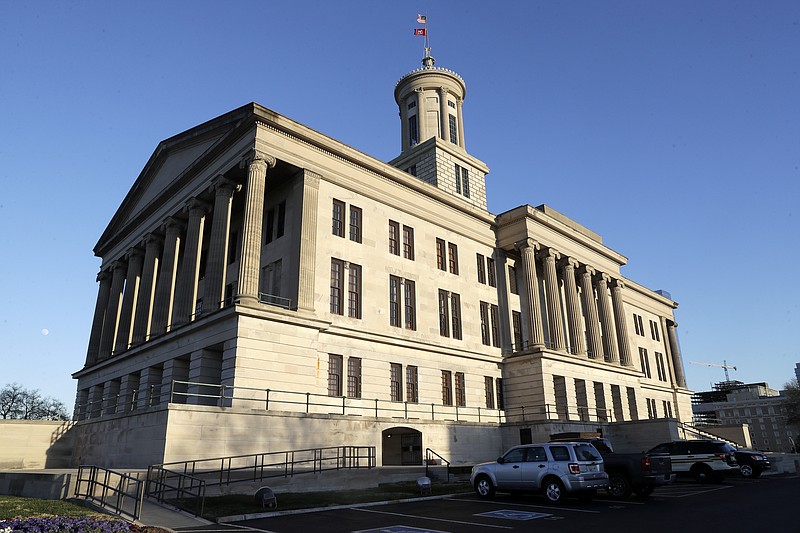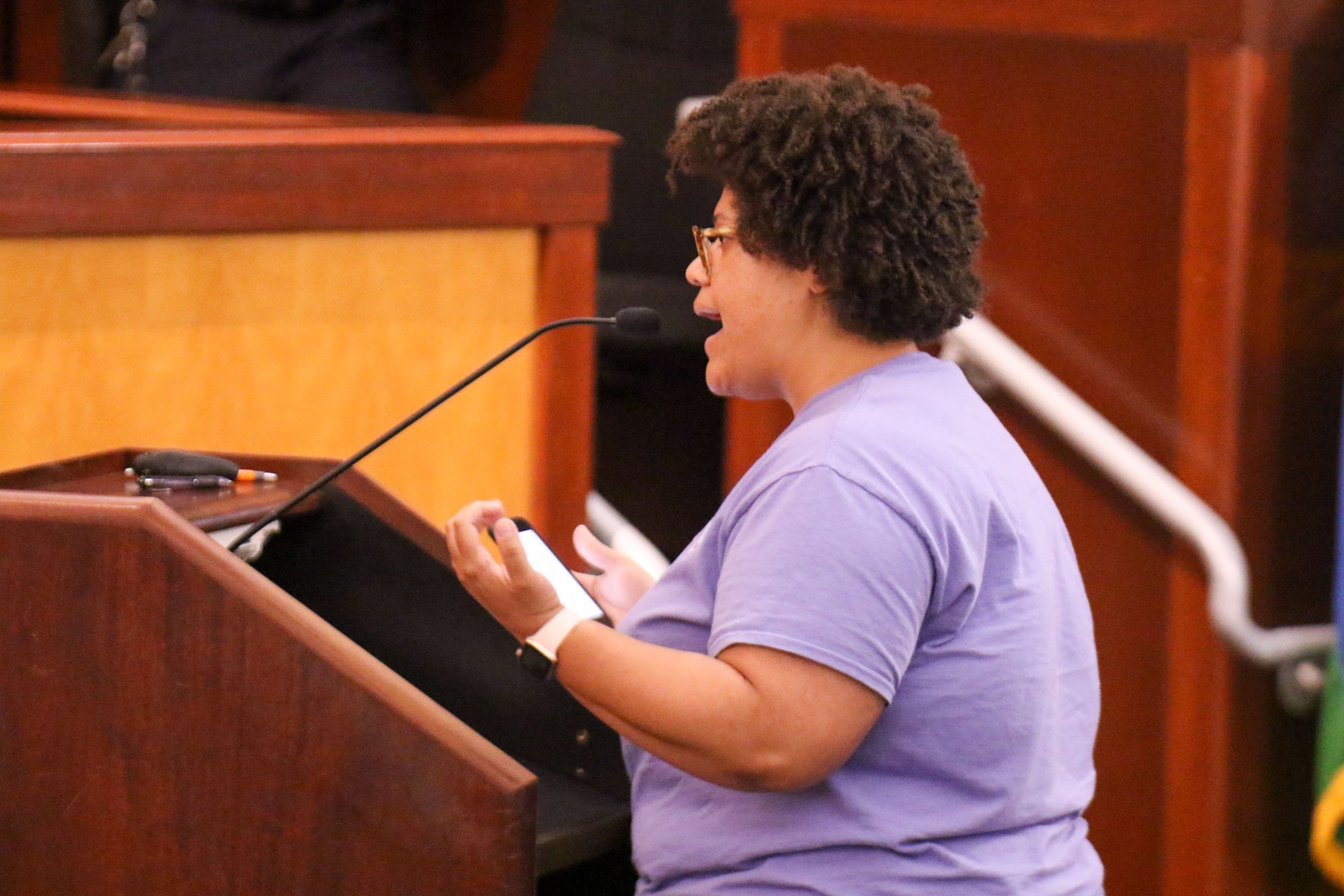NASHVILLE — Nearly 175 bills passed this year by Tennessee lawmakers take effect Saturday, but the fate of two of the new laws are now before judges, and the outcome remains uncertain.
One is a Republican measure that imposed a total ban on gender-affirming treatments, including surgery, hormone therapies and puberty blockers, for minors. The law is being challenged by LGBTQ+ groups and the American Civil Liberties Union of Tennessee.
U.S. District Judge Eli Richardson has allowed the ban on surgery to take effect. But the issue of hormone therapies and puberty blockers remains under review. Health care providers who violate the law would be subject to regulatory discipline and could be sued by the attorney general or private parties. Violations carry penalties of up to $25,000.
Also in legal play is a second measure, brought by Republican Gov. Bill Lee, to end the state's role in union dues collections for public school teachers who are members in the Tennessee Education Association. Members of that group, the Metro Nashville, Knox County and Lawrence County education associations and two teachers are challenging the law in state court. A three-judge panel Thursday granted a temporary restraining order continuing to bar Lee from ending dues collection. The order sets a July 13 hearing on the Tennessee Education Association's challenge to the law.
That organization has fought Lee on various issues, including school vouchers and the broadening of public charter schools. Lee's bill excluded other organized groups of public employees, such as the Tennessee State Employees Association.
173 bills set to become law
The Republican-dominated General Assembly ended its annual session in late April, passing well over 200 measures by the time all was said and done. Some became effective immediately, while others will ring in the new year.
But 173 of the bills take effect Saturday, the official start of state government's fiscal year.
They range from health care for transgender children to bolstering school safety in the wake of a deadly shooting attack on a private Christian elementary school in Nashville that left three children and three adults dead. The shooter was a former student at the school.
State Sen. Todd Gardenhire, R-Chattanooga, is touting a number of measures, including the Tennessee Works Tax Reform Act. It cuts taxes for Tennessee families and small businesses by more than $400 million while also providing targeted relief to families with a three-month-long sales-tax holiday on grocery taxes from Aug. 1-Oct. 31. The sales provision alone will enable consumers to collectively save $273 million.
Lowering the tax burden on small businesses is expected to save an estimated $150 million. Officials hope it will boost Tennessee's economic competitiveness and promote entrepreneurship.
"Business and families are the backbone of our economy, and providing tax relief to them is especially important now as we face the challenges of high inflation," Gardenhire said in a news release. "These historic tax cuts empower Tennesseans to invest, spend and save, and further establish our state as one of the most tax-friendly states in the country."
Also hitting the state's code books Saturday is a measure sponsored by Sen. Bo Watson, R-Hixson, that expands the state's existing Racketeer Influenced and Corrupt Organization Act of 1989 to include prosecuting conduct that illegally furthers the interest of the criminal organization. Among other provisions, Watson's legislation increases penalties under the act if the conviction is based upon a pattern of racketeering activity that involved a homicide.
School safety/guns
The March shooting at The Covenant School in Nashville spurred massive protests for new laws to keep firearms out of the hands of the mentally ill.
Republicans joined Lee in providing $232 million to fund school resource officers and pay for bolstering mandatory security measures at both public and private schools. Schools are now required to prepare annual safety plans.
Lee, who knew one of the victims of the school shooting, said he intends to call lawmakers back into special session to consider special legislation allowing judges to take guns away from people deemed dangerous, leaving some of his fellow Republicans seething. Some Republicans said the focus should be on mental health, not guns.
Republicans did pass — while Democrats objected — new lawsuit protections for gun and ammunition dealers, manufacturers and sellers. Republicans argued the bill protects businesses in a state that has welcomed gun manufacturers with open arms in recent years.
Lee made a last-minute push during the regular session to have lawmakers pass his proposal to keep weapons from people deemed to pose a risk of harm to themselves or others. Republicans wanted no part of that.
Union 'card check' organizing
In addition to hitting the teachers union, Republicans, including House Speaker Cameron Sexton, R-Crossville, and Rep. Greg Vital, R-Georgetown, pushed through a bill that withholds state economic incentives from companies that allow unions to use a "card-check" method to unionize instead of secret ballot elections.
It excludes Ford Motor Co.'s planned mammoth electric vehicle project in rural West Tennessee with South Korean battery manufacturer SK that will build electric pickup trucks and manufacture batteries.
Adoption
One new law revises the definition of abandonment for purposes of termination of parental rights to include circumstances in which the parent or guardian fails to visit or support the child for a period of three consecutive months if the child is less than 4 years of age.
Another law authorizes courts to waive certain waiting periods and expedite proceedings relative to the adoption of children abandoned or voluntarily left at a facility if certain conditions are met.
Other new laws
— One new measure prevents non-U.S. residents from buying property if they are from a nation sanctioned by the U.S. government. That list includes Afghanistan, Cuba and Iraq, among others.
— Another new law, sponsored by Gardenhire, bars public schools and universities from requiring employees to learn about implicit bias in trainings. It's a follow-up to previously passed legislation to restrict how teachers and professors discuss race in K-12 and colleges.
— City and county governments will be required to hold a period of public comment at their public meetings. The law authorizes governmental entities to place "reasonable" restrictions on the period for public comment.
— In an effort to sweeten his proposal ending union dues deductions for teachers, Lee included a provision on teacher pay. The law raises the minimum teacher salary for the 2026-27 school year to $50,000. The Tennessee Education Association has asked the court to leave the pay raise provision intact while still blocking the end to state dues collection.
— Political campaign committees for local public office will now have to file their disclosures with the Tennessee Registry of Election Finance instead of their county election commission. The new law also requires complaints on statements of local political campaign committees to be filed in the office of the Registry of Election Finance instead of the local district attorney.
— District attorneys will now be required to designate one assistant district attorney as lead prosecutor in cases involving crimes committed against children. The law also requires the Tennessee Bureau of Investigation to provide annual training to assistant district attorneys designated as lead prosecutors.
— Courts will now be allowed to consider for the purpose of enhancing a defendant's sentence whether the defendant committed an offense of aggravated assault or attempted first-degree murder on grounds or premises defined as a health care facility.
— Candidates for the office of constable will now have to undergo a cognitive and psychological examination by a licensed psychologist to ensure the fitness of the candidate prior to running for office.
— Landlords will have to provide 60 days notice of termination of tenancy for the purpose of eviction of a residential tenant of certain facilities for older people if the tenant has paid the due rent and is not behind on rent payments, and if the termination and eviction are to allow for new property development.
— The offense of desecration of a venerable object is being beefed up by changing the culpable mental state from intentionally to recklessly or knowingly desecrating a place of worship or burial or a state or national flag.
— The criminal offense of aggravated stalking is being expanded to include a person who commits stalking against a victim who is at least 65 or older.
— Life insurance providers will now be prohibited from canceling a life insurance policy based on genetic information, from requesting or requiring genetic testing as a condition of insurability and from accessing the genetic data of an individual without consent.
— Education officials are now tasked with creating a new pathway for honorably discharged veterans to receive an occupational teaching license.
Contact Andy Sher at asher@timesfreepress.com or 615-285-9480.

